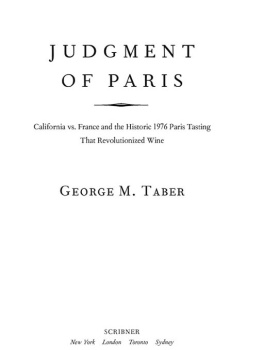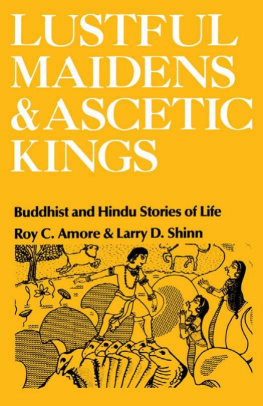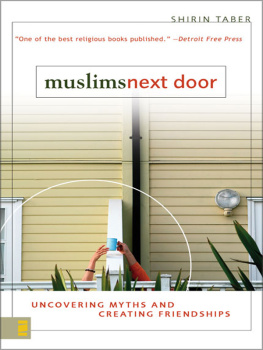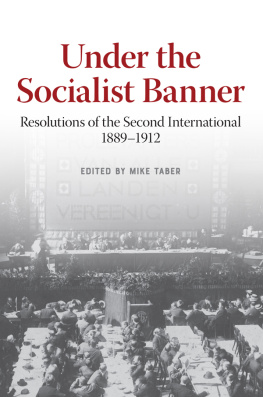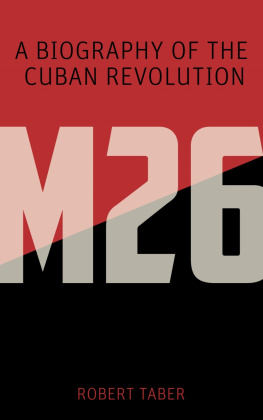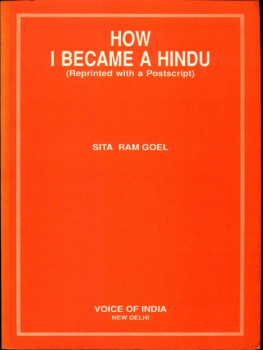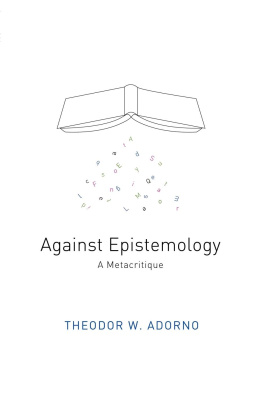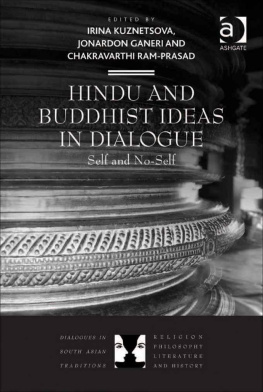Taber - A Hindu Critique of Buddhist Epistemology
Here you can read online Taber - A Hindu Critique of Buddhist Epistemology full text of the book (entire story) in english for free. Download pdf and epub, get meaning, cover and reviews about this ebook. year: 2011, publisher: Taylor & Francis (CAM), genre: Religion. Description of the work, (preface) as well as reviews are available. Best literature library LitArk.com created for fans of good reading and offers a wide selection of genres:
Romance novel
Science fiction
Adventure
Detective
Science
History
Home and family
Prose
Art
Politics
Computer
Non-fiction
Religion
Business
Children
Humor
Choose a favorite category and find really read worthwhile books. Enjoy immersion in the world of imagination, feel the emotions of the characters or learn something new for yourself, make an fascinating discovery.
- Book:A Hindu Critique of Buddhist Epistemology
- Author:
- Publisher:Taylor & Francis (CAM)
- Genre:
- Year:2011
- Rating:4 / 5
- Favourites:Add to favourites
- Your mark:
- 80
- 1
- 2
- 3
- 4
- 5
A Hindu Critique of Buddhist Epistemology: summary, description and annotation
We offer to read an annotation, description, summary or preface (depends on what the author of the book "A Hindu Critique of Buddhist Epistemology" wrote himself). If you haven't found the necessary information about the book — write in the comments, we will try to find it.
Taber: author's other books
Who wrote A Hindu Critique of Buddhist Epistemology? Find out the surname, the name of the author of the book and a list of all author's works by series.
A Hindu Critique of Buddhist Epistemology — read online for free the complete book (whole text) full work
Below is the text of the book, divided by pages. System saving the place of the last page read, allows you to conveniently read the book "A Hindu Critique of Buddhist Epistemology" online for free, without having to search again every time where you left off. Put a bookmark, and you can go to the page where you finished reading at any time.
Font size:
Interval:
Bookmark:

First published 2005
by RoutledgeCurzon
2 Park Square, Milton Park, Abingdon, Oxon OX14 4RN
Simultaneously published in the USA and Canada
by RoutledgeCurzon
270 Madison Ave, New York, NY 10016
This edition published in the Taylor & Francis e-Library, 2005.
To purchase your own copy of this or any of Taylor & Francis or Routledges collection of thousands of eBooks please go to www.eBookstore.tandf.co.uk.
RoutledgeCurzon is an imprint of the Taylor & Francis Group
2005 John Taber
All rights reserved. No part of this book may be reprinted or reproduced or utilised in any form or by any electronic, mechanical, or other means, now known or hereafter invented, including photocopying and recording, or in any information storage or retrieval system, without permission in writing from the publishers.
British Library Cataloguing in Publication Data
A catalogue record for this book is available from the British Library
Library of Congress Cataloging in Publication Data
A catalog record for this book has been requested
ISBN 0-203-42062-4 Master e-book ISBN
ISBN 0-415-33602-3 (Print Edition)
This is a translation of the chapter on perception (Pratyakapariccheda) from Kumrila Bhaas magnum opus, the lokavrttika, which is one of the central texts of the Hindu response to the logico-epistemological school of Buddhist thought. It is crucial for understanding the debates between Hindus and Buddhists about metaphysical, epistemological, and linguistic questions during the classical period.
In an extensive commentary, the author explicates the argument of the Pratyakapariccheda verse by verse while also showing how it relates to ideas and theories of other Indian philosophers and schools. Notes to the translation and commentary go further into the historical and philosophical background of Kumrilas ideas.
The book includes an introduction containing a summary of the history of Indian epistemology, an overview of Kumrilas philosophy, and a separate synopsis and analysis of Kumrilas text. It is a valuable contribution to the field of Indian philosophical studies.
John Taber is Associate Professor of Philosophy at the University of New Mexico, where he teaches courses in Asian thought and continental philosophy. His research has focused on the history of Indian philosophy, especially logic, epistemology, and metaphysics during the classical period, 5001200 CE. He is also the author of Transformative Philosophy: A Study of akara, Fichte, and Heidegger.
Series editor: Francis X. Clooney, SJ

The RoutledgeCurzon Hindu Studies Series, in association with the Oxford Centre for Hindu Studies, intends primarily the publication of constructive Hindu theological, philosophical and ethical projects aimed at bringing Hindu traditions into dialogue with contemporary trends in scholarship and contemporary society, and with the particular concerns of Hindus living in India and abroad today. The series also invites proposals for annotated translations of important primary sources and studies in the history of the Hindu religious traditions.
EPISTEMOLOGIES AND THE LIMITATIONS OF PHILOSOPHICAL INQUIRY
Doctrine in Madhva Vedanta
Deepak Sarma
A HINDU CRITIQUE OF BUDDHIST EPISTEMOLOGY
Kumrila on perception
The Determination of Perception chapter of Kumrila Bhaas lokavrttika
Translation and commentary
John Taber
FOR DEB
The RoutledgeCurzon Hindu Studies Series, published in collaboration with the Oxford Centre for Hindu Studies, intends primarily the publication of constructive Hindu theological, philosophical, and ethical projects. The focus is on issues and concerns of relevance to readers interested in Hindu traditions and a wider range of related religious concerns that matter in todays world. The Series seeks to promote excellent scholarship and, in relation to it, an open and critical conversation among scholars and the wider audience of interested readers. Though contemporary in its purpose, the Series also recognizes the importance of a contemporary retrieval of the classic texts and ideas, beliefs and practices, of Hindu traditions. One of its goals then is the promotion of fresh conversations about what has mattered traditionally.
It is therefore most fitting that John Tabers A Hindu Critique of Buddhist Epistemology: Kumrila on Perception should be one of the first volumes in the Series. Mms ritual thinking and exegesis, traditionally listed as one of the six major systems of Hindu theology and philosophy (darana), is a superlative and uniquely Indian mode of thought. As Taber explains in his own Preface and his Introduction, Kumrila Bhaa is not only a leading Mms thinker, but also one of the leading intellectuals of the Indian tradition, a formidable exemplar of the intellectual rigor, analysis, and argumentation for which India is rightly famous. Although Kumrilas lokavrttika of which a major chapter is translated and interpreted here has been available in English for nearly a century, so great a classic deserves the benefit of multiple renderings in English, and indeed has long been in need of a thoroughly accurate translation and elaboration. Tabers painstaking yet lucid translation, accompanied by valuable notes, brings Kumrilas arguments to life, in a way that is accessible even for someone who is not a master of Sanskrit, while still satisfying trained Sanskritists.
As readers unfamiliar with Kumrila Bhaa gradually find their way into this demanding but richly rewarding treatise on perception, they may at first wonder whether and how this technical argumentation enhances our knowledge of Hindu religious traditions, even the ritual traditions connected with Mms. Yet A Hindu Critique of Buddhist Epistemology clearly illumines an important dimension of the Hindu traditions in part simply by showing us a leading Brahmanical thinker at work, exemplifying how he thought through and deciphered the meaning of reality and our ways of knowing it, and how very elegant Indian religious thinking can be.
A Hindu Critique of Buddhist Epistemology also shows Kumrila in determined disputation with Buddhist opponents, arguing the fine points of epistemology; clearly, he is determined to concede nothing to his intellectual adversaries. As Taber points out and highlights by the books title Kumrilas critique of Buddhist epistemology is a single extended argument (a treatise in itself, though actually only a part of the full argument that is the lokavrttika), a stellar example of how a committed intellectual makes his case, stands by his insights and proposals, and probes his adversaries positions for what can be learned from them and what in his view is mistaken or needs to be corrected. Modern concerns and values have largely moderated our modes of interreligious conversation today, and few of us are likely to proceed so unrelentingly and fiercely as did Kumrila. Nevertheless, his intellectual rigor and uncompromising commitment to clear understanding are values A Hindu Critique of Buddhist Epistemology fittingly highlights early on in this Series. Even in a crosscultural and interreligious environment, we need to remember how to argue well with one another.
Francis X. Clooney, SJ
Series editor
Font size:
Interval:
Bookmark:
Similar books «A Hindu Critique of Buddhist Epistemology»
Look at similar books to A Hindu Critique of Buddhist Epistemology. We have selected literature similar in name and meaning in the hope of providing readers with more options to find new, interesting, not yet read works.
Discussion, reviews of the book A Hindu Critique of Buddhist Epistemology and just readers' own opinions. Leave your comments, write what you think about the work, its meaning or the main characters. Specify what exactly you liked and what you didn't like, and why you think so.





